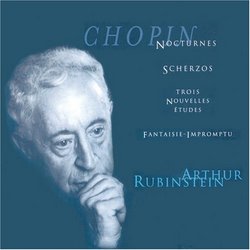| All Artists: Frederic Chopin, Artur Rubinstein Title: Rubinstein Collection, Vol. 26 Members Wishing: 1 Total Copies: 0 Label: RCA Release Date: 7/10/2001 Album Type: Box set, Original recording remastered Genre: Classical Styles: Forms & Genres, Etudes, Fantasies, Historical Periods, Modern, 20th, & 21st Century, Symphonies Number of Discs: 2 SwapaCD Credits: 2 UPC: 090266302628 |
Search - Frederic Chopin, Artur Rubinstein :: Rubinstein Collection, Vol. 26
 | Frederic Chopin, Artur Rubinstein Rubinstein Collection, Vol. 26 Genre: Classical
|
Larger Image |
CD Details |
CD ReviewsRestless Nocturnes and Furious Scherzos Hank Drake | Cleveland, OH United States | 09/16/2001 (4 out of 5 stars) "It probably never occurred to Arthur Rubinstein that all of his recordings would eventually be re-released, available in a gargantuan complete edition, and that enthusiasts would compare and debate the merits of various performances. Rubinstein made three traversals of the complete Nocturnes (well, mostly complete, except for some juvenile pieces which the pianist ignored). This, the second set, was made for long playing records in 1949-50 and was intended to replace the 78RPM set made in 1936-37. I find this later set curiously unsatisfying. It has neither the seductiveness of the 1930s Nocturnes, nor the sober gravitas of the 1965 stereo remake. There are moments of restlessness here, some technical problems(the trills in Op. 62, No. 1 are thoroughly messed-up), and even some misinterpretations of the text (there is a serious mis-interpretation of the ending of Op. 32, No. 1). Although Rubinstein was the 20th Century's most important Chopin interpreter, he didn't play many of the works in public, and I have the sneaking suspicion that many of the pieces in this collection are being sight-read.Rubinstein is more successful in the Scherzos. Again this is the second of three complete sets. This version, from 1949, is more stable technically than the rather wild 1932 set, and more dazzling than the 1959 stereo remake. Although each set has its merits, on most levels this is the most successful of the three. Although Rubinstein never made a complete version of Chopin's Etudes (an attempt at these works was abandoned after one session) he did make two recordings of the Trois Nouvelles Etudes. This first version, from 1958, was one of his first stereo solo recordings, and is somewhat more fleet fingered and lively that the 1962 remake.Rubinstein's 1964 recording of Chopin's ubiquitous Fantasie-Impromptu (Volume 47) is to be preferred over the earlier version included here. Not only is the recorded sound superior in the later version, but Rubinstein in 1964 performed the piece from a then recently discovered manuscript which is undoubtedly the definitive version.The sound in the mono pieces is rather hard and brittle. The Etudes, recorded in stereo, fare much better."
|

 Track Listings (14) - Disc #1
Track Listings (14) - Disc #1